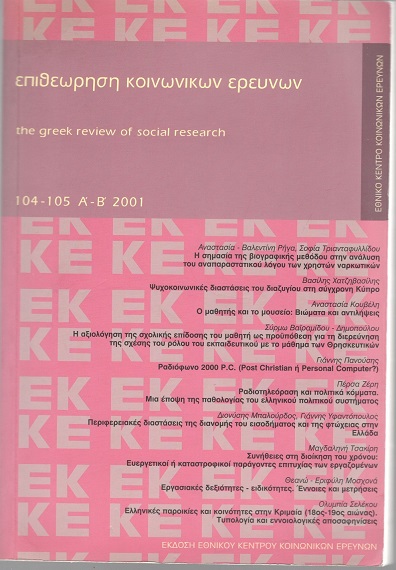Οι κοινωνικές αναπαραστάσεις των Ελλήνων για τον εαυτό και τον άλλο (τον Τσιγγάνο)
Abstract
Η παρουσία του τσιγγάνικου πληθυσμού στην Ελλάδα δεν αποτελεί τωρινό φαινόμενο και ο κατά πολύ αυξημένος -σε σύγκριση με άλλες ευρωπαϊκές χώρες αριθμός τους τους καθιστά μια αξιοπρόσεκτη μειονότητα μέσα στο συνονθύλευμα των ανθρώπων από διαφορετικές χώρες που αναζητούν καλύτερη τύχη στον ελλαδικό χώρο. Το παρόν άρθρο επιχειρεί να διερευνήσει τις κοινωνικές αναπαραστάσεις που έχουν σχηματίσει οι Έλληνες για τον τσιγγάνικο πληθυσμό, πώς αντιλαμβάνονται τη δική τους εθνική ταυτότητα και, με μέτρο αυτήν, πού τοποθετούν τους Τσιγγάνους μέσα στο κοινωνικό τους περιβάλλον. Η ερμηνεία των αποτελεσμάτων πραγματοποιείται μέσα από τη θεωρία των κοινωνικών αναπαραστάσεων. Τα αποτελέσματα εμφανίζουν μια σαφή εικόνα οφειλόμενη κυρίως στον τρόπο ζωής και την εξωτερική εμφάνιση των Τσιγγάνων, καθώς επίσης και μια ισχυρή (θετική) ελληνική εθνική ταυτότητα.
Article Details
- How to Cite
-
Ρήγα Α.-Β., & Δαιμονάκου Σ. (2002). Οι κοινωνικές αναπαραστάσεις των Ελλήνων για τον εαυτό και τον άλλο (τον Τσιγγάνο). The Greek Review of Social Research, 108, 257–283. https://doi.org/10.12681/grsr.9072
- Issue
- 2002: 108-109 Β'-Γ'
- Section
- Articles

This work is licensed under a Creative Commons Attribution-NonCommercial 4.0 International License.
Authors who publish with this journal agree to the following terms:
- Authors retain copyright and grant the journal right of first publication with the work simultaneously licensed under a Creative Commons Attribution Non-Commercial License that allows others to share the work with an acknowledgement of the work's authorship and initial publication in this journal.
- Authors are able to enter into separate, additional contractual arrangements for the non-exclusive distribution of the journal's published version of the work (e.g. post it to an institutional repository or publish it in a book), with an acknowledgement of its initial publication in this journal.
- Authors are permitted and encouraged to post their work online (preferably in institutional repositories or on their website) prior to and during the submission process, as it can lead to productive exchanges, as well as earlier and greater citation of published work (See The Effect of Open Access).






